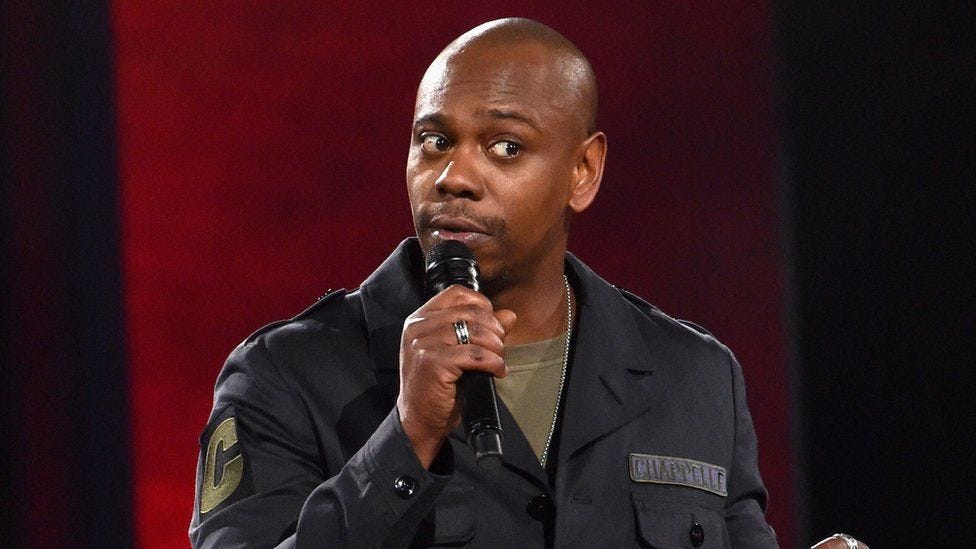Three things that give me hope
None of them are Dave Chappelle. Or at least not exactly.

David Chappelle has a problem with trans people. That’s the short version of the controversy that has blown up in recent days over his Netflix special. And there’s merit to the critique. Chappelle’s biting wit, which has historically been deployed most powerfully against anti-Black racism, has been turned in his recent comedy against groups of people who already face bullying, humiliation, and even violence. Take, for example, the following bit:
In less than 2 minutes, Chappelle manages to mock not just one but two communities: trans people and Asian Americans. But many others have written about why Chappelle is wrong to mock those who already face abuse. I want to instead make three simple observations about the Chappelle controversy:
Activism is being normalized. While Chappelle and his friend Joe Rogan mourn the days when comedy was free from politics, it’s not just comedy, but American life, that is now subject to ethical scrutiny. This is probably necessary for change. I can remember the days, not so long ago, when activism felt like an afterthought in the mainstream. Books were being written about the end of history. And political figures like Bill Clinton predicted that we could “triangulate” our way into the future — no boat rocking allowed. But today, even powerful figures like Chappelle are feeling pressure.
Anti-corporate sentiment is growing. One of the very interesting things about Chappelle’s response to the critiques is that he blames corporate power. This is similar to an argument made by my friend Leighton Woodhouse, on a podcast that I am going to release next week: that identity politics is a way for corporate elites to distract people from their overwhelming power (and abuse of power). Listen to Chappelle’s response at 1:00:
I’m skeptical that corporate interests are driving efforts to cancel Chappelle. What seems to be happening, instead, is a genuine grassroots effort to change the conversation on trans-rights (and a successful one, at that). The corporate masters at companies like ABC or Time Warner could not care less, intrinsically, about civil rights causes, and they certainly don’t want their most profitable talent, like Chappelle, cancelled. It’s nonetheless a good sign that everyone agrees that corporate power is a problem. The trans activists. The defenders of Chappelle. And even Chappelle himself. That is something we can build on.
Conversations that were once unthinkable are now out in the open. So much of social change work is simply about agenda setting. The old story about Joseph Stalin is that the changed the Russian Revolution, and the course of history, because he was secretary of the Russian Communist Party. In that position, he could determine what was discussed, and how it was framed. What’s important about the controversy over Chappelle is that conversations that, even a few years ago, probably would not have happened. And that a decade ago probably would have been unthinkable (in no small part due to the disgust reaction that Chappelle shows in his specials). Those conversations are now happening out in the open. That’s progress, and suggests we can get other silenced conversations pushed forward, too.
That’s not to say that there aren’t worrying signs, too, in the Chappelle controversy. The vitriol on all sides must be overcome if we’re going to make change. (A progressive movement where anti-racist activists and trans activists are fighting one another is not going to be a strong one.) But I still think the three factors about should make us hopeful about the prospect for change.
Chappelle himself has been a powerful voice for justice. His words after George Floyd’s murder may someday go down in the history books.
These are the words of a deeply good human being. It’s hard for me not to think that, with dialogue, the hurt caused by Chappelle’s comedy can’t be resolved. And while changing Chappelle won’t change the world, it’s a sign of what’s possible.


